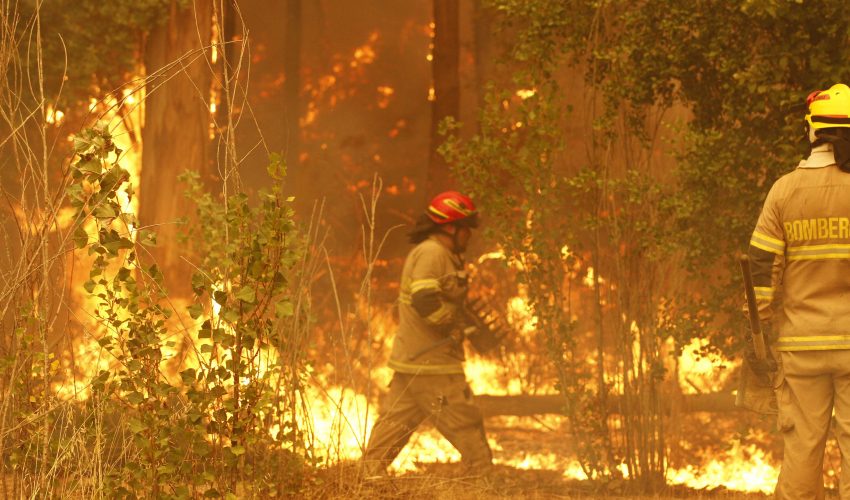At the University of Concepción, the Minister of Agriculture, Esteban Valenzuela, together with the scientific community and forestry associations, led the launch of the participatory process for "More Forests and Sustainable Ecosystems."
The process will last six months and aims to generate agreements that enable the sector's development, define a renewed strategic plan, and establish concrete plans involving the broadest spectrum of stakeholders and local communities, targeting a transformation of the current forestry model.
According to the Secretary of State, this initiative is also part of drafting a new promotion law for the sector.
"This is historic because President Gabriel Boric announced, in the context of the wildfires we faced, that we would engage in deep dialogue with all stakeholders in the Southern Zone of the country, in the forestry sector, to strengthen a more resilient, sustainable, and also more productive sector," explained Minister Valenzuela.
The process will be led by a team from the National Forestry Corporation (Conaf), the Office of Agricultural Studies and Policies (Odepa), and the Forestry Institute (Infor), tasked with guiding and monitoring this effort to validate and adjust the vision, objectives, and goals for the sector by 2050.
In this context, one of the commitments made is the planting of 20 thousand hectares annually over a 10-year period.
Along with establishing short- and medium-term implementation plans involving all sector stakeholders and territories, this new model, as Valenzuela noted, enhances the role of forest and xerophytic ecosystems, considering climate change effects, to establish high-value goods and services and foster an economy based on respect for nature, communities, and territories.
"After a decade in which promotion instruments were exhausted, we must also discuss and find ways to promote the valorization of our timber, increasing its presence in housing, schools, and all aspects, while improving forest conservation and ensuring growth in both native forest management and the forestry industry, as we are not meeting environmental commitments," stated the Secretary of State.
Additionally, the head of the Agriculture Ministry referred to the program's commitments, detailing, "We commit to reaching 200 thousand hectares in forestry, and we are far from that. We must agree on how to do it right, as all stakeholders here expressed their willingness to dialogue and, through an evolutionary process, continue improving the industry's best practices."
The process launched at UdeC also aims to establish the groundwork for drafting a regulatory proposal related to the forestry sector, native forests, sector promotion, among others, with its presentation projected for the first half of 2024.
"These discussions start here, in Concepción, over six months until we formulate a new law in the first half of next year—whether it's called a law for more sustainable forests or a new sustainable agroforestry law," said Valenzuela, adding, "A key part of this agenda, seeking formulas for a new promotion law, stems from the Government listening to the insistence of various stakeholders, small, medium, and large, in our forestry sector."
It should be noted that the initiative includes four stages over six months, involving representatives from the public sector, local communities, professional associations, NGOs, unions, Indigenous peoples, academia, forestry associations, Indigenous and non-forestry women. The process will conclude with a final document outlining key agreements.
Meanwhile, Conaf's Executive Director, Christian Little, highlighted the plan's launch through dialogues, stating, "This is tremendous news for our forestry sector, a sector that contributes to territorial development. After years of public inactivity in discussing medium- and long-term political agendas, a broad discussion process begins to incorporate new ideas into new policy instruments."
Little also emphasized the initiative's environmental goals, such as carbon neutrality policies and protecting forest ecosystems nationwide.
"We are very pleased because there is a willingness among all stakeholders to reach agreements and because there is recognition of the need to transition toward new paradigms regarding the sector's contribution, the role of forest ecosystems, xerophytic ecosystems, native forests, and plantations in addressing the climate crisis and advancing carbon neutrality," affirmed Conaf's Executive Director.
Little clarified that the program builds on background and information gathered by various councils across the country linked to the current forestry model, involving diverse sector stakeholders.
"We are not starting from scratch. There are histories from different associations, perspectives, and viewpoints, which we have gathered over two years of discussions in the Forest Policy Council, the Civil Society Council, and the Native Forest Council. There are multiple dialogue instances, such as the Wood Roundtable, that capture ideas and development perspectives from each association, small landowners, and Indigenous communities, providing a baseline to begin work," concluded Little.
Associations
From the private sector, Juan José Ugarte, President of the Chilean Wood Corporation (Corma), emphasized building a new regulation for the forestry model, stating, "We have taken a major step, which will culminate in a new forestry promotion law focused on small and medium landowners. This has happened in Chile's forestry capital, the Biobío Region (…) because the first step toward this law will be inclusive dialogues—dialogues in territories, communes, and listening to one another to jointly build this vision for the future."
Regarding the event's goal of forest planting, Ugarte stressed, "Chile needs more forests and has committed to 20 thousand hectares—20 thousand national stadiums—annually for the next 10 years. This must be done sustainably, close to communities and territories."
Meanwhile, the Presidential Delegate in Biobío, Daniela Dresdner, stated, "In light of the wildfires, many discussions have arisen about what we must do with different forestry sectors, as well as interface zones and rural residents, which is part of this discussion."
Source:www.diarioconcepcion.cl







Comments (0)
No comments yet. Be the first to comment!
Leave a comment